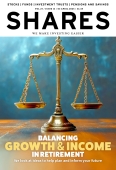Archived article
Please note that tax, investment, pension and ISA rules can change and the information and any views contained in this article may now be inaccurate.
Are ISA investors more adventurous than SIPP investors?

On paper, you might think ISA investors are likely to be more risk-tolerant than SIPP investors.
After all, if you own a SIPP you are actually managing your own pension so surely you aren’t going to take big risks with your financial future?
On the other hand, ISAs are a good way to shelter capital gains from the tax man so if you have an ISA you are probably more likely to ‘swing for the fence’ as they say in baseball in the hope of netting big returns.
In fact, judging by some of the most popular holdings on the AJ Bell platform – which excludes AJ Bell funds – investors in SIPPs and ISAs have a lot more in common than you might think.
SURPRISINGLY SIMILAR
Contrary to expectations, ISA investors don’t appear to be big risk-takers, nor are all SIPP investors stick-in-the muds.
There is a great deal of cross-over between many of the most popular holdings across both groups of investors, with no fewer seven funds or stocks appearing on both lists.
It would appear ISA and SIPP investors are equally keen on Baillie-Gifford-run investment trust Scottish Mortgage (SMT) and Terry Smith-steered fund Fundsmith Equity (B41YBW7).
Interestingly, among the usual big dividend-paying SIPP stocks like Aviva (AV.), BP (BP.), GSK (GSK) and Shell (SHEL), one name stands out like a sore thumb – AI chipmaker and all-round tech favourite Nvidia (NVDA:NASDAQ).
If anything, ISA investors seem content to take a more broad-brush approach to investing, with two S&P 500 tracker funds on the list alongside Fidelity Index World (BJS8SJ3) and a LifeStrategy fund from US firm Vanguard, whereas SIPP investors seem to prefer individual stocks.
THE FOLLY OF YOUTH?
If ISA and SIPP investors think along the same lines, are there any marked differences of opinion between say older and younger ISA investors?
This time there are, but again the answer isn’t necessarily what you might expect.
Younger people have more time to amass a ‘pot’, so you might think they would take a more ‘risk-on’ attitude and make quite concentrated bets, whereas older investors are likely to want to protect their capital so they will spread their bets.
In fact, almost the opposite is true – younger investors are more likely to invest in funds and spread their risk, while older investors prefer individual stocks.
AJ Bell investment analyst Dan Coatsworth believes there’s a logic to this, as younger, less experienced investors might lack the time, expertise or confidence to research individual stocks and prefer to get instant diversification through funds.
‘Global equity funds are popular among those aged 18 to 30 as they provide exposure to companies around the world at the click of a button,’ explains Coatsworth.
Once this cohort move on into their 30s and 40s, it’s reasonable to expect them to be moving up the career ladder and potentially having more money to invest.
This is where risk-taking begins to manifest itself, as with time on their side and decades to go to retirement many are happy to seek higher-risk investments such as in the tech space where they might be up to speed with the latest innovations.
US tracker funds are also popular among this age group, as America is the land of mega-cap tech firms.
AGE AND EXPERIENCE
‘Those in their 50s are typically better-placed financially – they may be in the final phase of paying off their mortgage, or they are earning a decent crust which covers all the bills and leaves plenty left over to invest,’ observes Coatsworth.
Funds are still popular with this age group but it’s common to see individual tech stocks such as Nvidia ranking on a par with blue-chip dividend payers like Lloyds (LLOY).
It’s towards their late 50s, when they start to think about retirement coming around the corner, that investors typically start to think about de-risking their portfolios.
The transition to a more stock-heavy ISA is clear once you look at the 60+ age group, flags Coatsworth, with large-cap income stocks such as GSK and Legal & General (LGEN) featuring regularly.
‘Older people might feel these are trusted names that have been around for years and are the type of company which won’t disappear in a puff of smoke.’
Investment trusts are popular among those in their 70s and older, with a particular bias towards those with an equity income focus.
Whereas high yields are widely available among more niche investment trusts, such as renewable energy or debt vehicles, older AJ Bell investors have shown a preference towards ones with more familiar assets in their portfolio.
Names like JPMorgan Global Growth & Income (JGGI) and City of London Investment Trust (CTY) feature heavily in ISAs for this age group, as their portfolios are full of big, well-known companies.
Interestingly, stocks are still the most popular asset among ISA investors in their 80s, 90s and older.
‘You might think people of this age are heavily invested in bonds, but that’s often not the case, unless they’ve chosen to hold fixed income investments in a pension and are using an ISA for higher-risk equity exposure,’ concludes Coatsworth.
Disclaimer: AJ Bell referenced in this article, own Shares magazine. The author (Ian Conway) and editor (Tom Sieber) of this article own shares in AJ Bell.
Important information:
These articles are provided by Shares magazine which is published by AJ Bell Media, a part of AJ Bell. Shares is not written by AJ Bell.
Shares is provided for your general information and use and is not a personal recommendation to invest. It is not intended to be relied upon by you in making or not making any investment decisions. The investments referred to in these articles will not be suitable for all investors. If in doubt please seek appropriate independent financial advice.
Investors acting on the information in these articles do so at their own risk and AJ Bell Media and its staff do not accept liability for losses suffered by investors as a result of their investment decisions.
Issue contents
Editor's View
Feature
Great Ideas
Investment Trusts
News
- Shares in Naked Wines pop to year-high on plan to unlock value
- Aston Martin Lagonda shares skid to new low on US tariffs
- Interest in European infrastructure and renewables continues to build
- S&P 500 endures worst quarter since 2022 on stagflation fears
- Why WH Smith was prepared to sell its High Street stores at bargain basement price
 magazine
magazine








